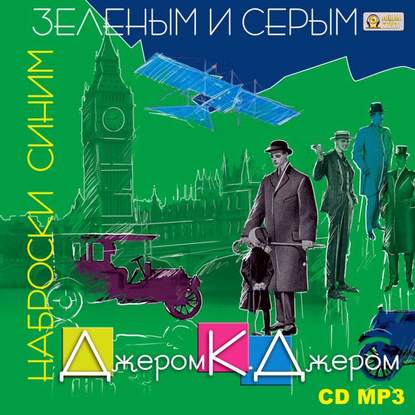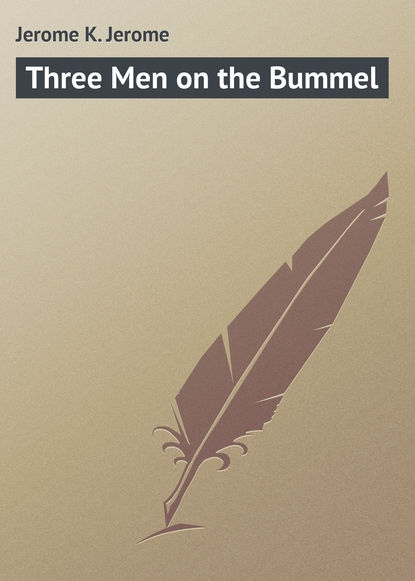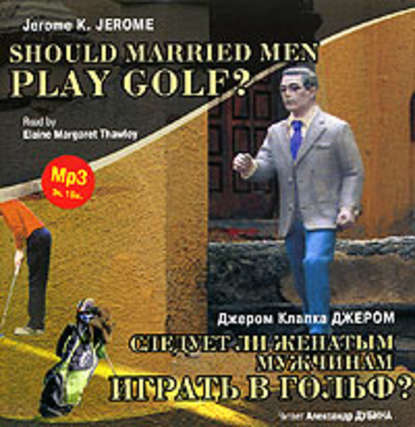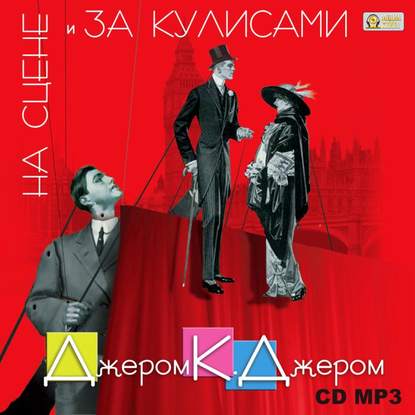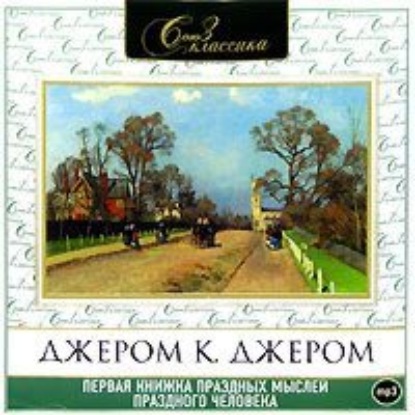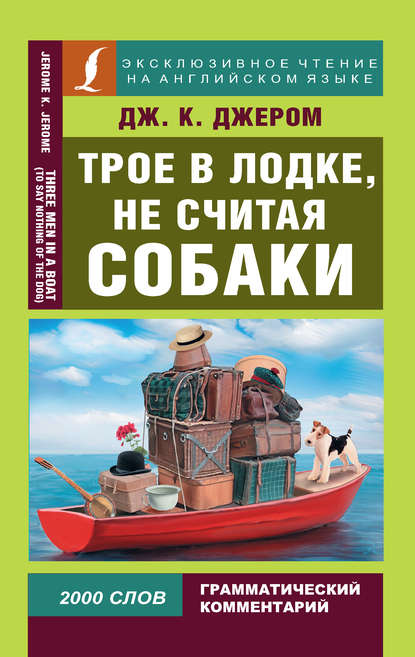
Полная версия
Трое в лодке, не считая собаки / Three Men in a Boat (To Say Nothing of the Dog)
Chapter VII
It was while passing through Moulsey Lock[46] that Harris told me about his maze experience. It took us some time to pass through, as we were the only boat, and it is a big lock.
I have stood and watched it. The river affords a good opportunity for dress. For once in a way, we men are able to show our taste in colours. I always like a little red in my things – red and black. You know my hair is golden brown, and a dark red matches it beautifully. I like a red silk handkerchief round the waist – a handkerchief looks so much better than a belt.
Harris always keeps to shades or mixtures of orange or yellow, but I don’t think he is at all wise in this. His complexion is too dark for yellows. Yellows don’t suit him: there can be no question about it. I want him to take to blue as a background, with white or cream; but the less taste a person has in dress, the more obstinate he is.
George has bought some new things for this trip. But his blazer is loud.[47] He brought it home and showed it to us on Thursday evening. We asked him what colour he called it, and he said he didn’t know. He didn’t think there was a name for the colour. The seller had told him it was an Oriental design. George put it on, and asked us what we thought of it. Harris said that it is perfect to frighten the birds away. What troubles Harris and myself, is that this blazer will attract attention to the boat.
Harris wanted to get out at Hampton Church, to go and see Mrs. Thomas’s tomb.
“Who is Mrs. Thomas?” I asked.
“How should I know?” replied Harris. “She’s a lady that’s got a funny tomb, and I want to see it.”
I objected. Harris, however, adores tombs, and graves, and epitaphs, and monumental inscriptions, and the thought of not seeing Mrs. Thomas’s grave made him crazy. He said he had looked forward to seeing Mrs. Thomas’s grave from the first moment that the trip was proposed.
I reminded him of George, and how we had to get the boat up to Shepperton. George was working at the bank there and he had to join us later.
“I never see him doing any work there,” said Harris. “He sits behind a bit of glass all day, trying to look as if he was doing something. What use is he there, and what’s the good of their banks? If he was here, we could go and see that tomb. I don’t believe he’s at the bank at all. I’m going to get out, and have a drink.”
It is always best to let Harris say everything he wants. Then he pumps himself out,[48] and is quiet afterwards.
I reminded him that there was concentrated lemonade in the hamper, and a gallon-jar of water in the nose of the boat, and we could mix them and make a cool and refreshing beverage.
Then he said those beverages produced dyspepsia, and ruined body and soul alike, and were the cause of half the crime in England.
He added he must drink something, however, and climbed upon the seat, and began to look for the bottle. It was right at the bottom of the hamper, and seemed difficult to find, and he had to lean over further and further, and, he pulled the wrong line, and sent the boat into the bank, and the shock upset him, and he dived down right into the hamper, and stood there on his head. He dared not move for fear of going over,[49] and had to stay there till I could get hold of his legs, and take him back, and that made him madder than ever.
Chapter VIII
We stopped under the willows, and lunched. It is a pretty little spot there: a pleasant grass plateau with willows. We had just commenced the third course – the bread and jam – when a gentleman came along, and wanted to know if we knew that we were trespassing.[50] We said we did not know, but we could believe him.
We thanked him, but he still hung about, and seemed to be dissatisfied, so we asked him if there was anything further that we could do for him; and Harris offered him a bit of bread and jam.
The man said that it was his duty to turn us off. He would go and consult his master, and then come back.
Of course, we never saw him any more, and, of course, all he really wanted was a shilling. Harris said he not only wanted to kill the man but sing comic songs[51] on the ruins of his house.
You have never heard Harris sing a comic song. It is one of Harris’s fixed ideas that he can sing a comic song. The fixed idea, on the contrary, among those of Harris’s friends who have heard him try, is that he can’t and never will be able to.
When Harris is at a party, and is asked to sing, he replies: “Well, I can only sing a comic song, you know;” and he shows that is a thing that you ought to hear once, and then die.
“Oh, that is nice,” says the hostess. “Do sing one, Mr. Harris”; and Harris gets up, and comes to the piano.
“Now, silence, please, everybody”, says the hostess, turning round. “Mr. Harris is going to sing a comic song!”
“Oh, how jolly!” they murmur; and they hurry in, and come up from the stairs, and crowd into the drawing-room, and sit round.
Then Harris begins.
Well, you expect a wonderful voice for a comic song. You don’t expect correct phrasing or vocalization. But you do expect the words. You don’t – well, I will just give you an idea of Harris’s comic singing, and then you can judge of it for yourself.
HARRIS (standing up in front of piano and addressing the expectant mob): “I’m afraid it’s a very old thing, you know. I expect you all know it, you know. But it’s the only thing I know. It’s the Judge’s song – no, I don’t mean it – I mean – you know what I mean – the other thing, you know. You must all join in the chorus, you know.”
Brilliant performance of prelude to the Judge’s song by nervous Pianist. Moment arrives for Harris to join in. Harris takes no notice of it. Nervous pianist commences prelude over again, and Harris, commencing singing at the same time, dashes off[52] the first two lines. Nervous pianist tries to finish the prelude, then he tries to follow Harris with accompaniment, and stops.
HARRIS (with kindly encouragement): “It’s all right. You’re doing it very well, indeed – go on.”
NERVOUS PIANIST: “I’m afraid there’s a mistake somewhere. What are you singing?”
HARRIS (promptly): “The Judge’s song. Don’t you know it?”
A FRIEND OF HARRIS’S (from the back of the room): “No, you’re not, you’re singing the Admiral’s song.”
Long argument between Harris and Harris’s friend as to what Harris is really singing.[53] Friend finally suggests that it doesn’t matter what Harris is singing, and Harris requests pianist to begin again. Pianist starts prelude to the Admiral’s song, and Harris begins.
HARRIS: ‘When I was young and called to the Bar.’
General roar of laughter, taken by Harris as a compliment. Pianist, thinking of his wife and family, retires; his place is taken by a stronger-nerved man.
THE NEW PIANIST (cheerily): “Now then, old man, you start off, and I’ll follow. We won’t bother about any prelude.”
HARRIS (laughing): “Oh, I beg your pardon. Of course – I’ve mixed up the two songs. It was Jenkins[54] confused me, you know. Now then.
Singing; his voice sounds like an approaching earthquake.
‘When I was young I served a term As office-boy to an attorney’s firm.[55]’
(Aside to pianist): “It is too low, old man; we’ll have that over again, if you don’t mind.”
[Sings first two lines over again, in a high falsetto[56] this time.
Great surprise on the part of the audience. Nervous old lady near the fire begins to cry.]
HARRIS (continuing): ‘I swept the windows and I swept the door, And I – ’
No – no, I cleaned the windows of the big front door.
And I polished up the floor – no, dash it[57] – I beg your pardon – funny thing, I can’t think of that line. And I – and I – Oh, well, we’ll get on to the chorus (sings):
‘And I diddle-diddle-diddle-diddle-diddle-diddle-de, Till now I am the ruler of the Queen’s navee.[58]’
Now then, chorus – it is the last two lines repeated, you know.
GENERAL CHORUS: “And I diddle-diddle-diddle-diddle-diddle-diddle-de, Till now I am the ruler of the Queen’s navee.”
And Harris never sees what an idiot he is making of himself, and how he is annoying a lot of people who never did him any harm. He promises them to sing another comic song after supper.
We reached Sunbury Lock at half-past three. The river is sweetly pretty just there before you come to the gates, and the backwater is charming; but don’t attempt to row up it.[59]
I tried to do so once. I was sculling, and asked the fellows if they thought it could be done, and they said, oh, yes, they thought so, if I pulled hard. We were just under the little footbridge.
I pulled splendidly. My two friends said it was a pleasure to watch me. At the end of five minutes, I thought we ought to be near the weir, and I looked up. We were under the bridge, in exactly the same spot that we were when I began.
We sculled up to Walton,[60] a rather large place for a riverside town. Caesar,[61] of course, had a little place at Walton – a camp, or an entrenchment, or something of that sort. Also Queen Elizabeth,[62] she was there, too. You can never get away from that woman, go where you will.[63]
There is an iron ‘scold’s bridle[64]’ in Walton Church. They used these things in ancient days for curbing women’s tongues. They have given up the attempt now. I suppose iron was getting scarce,[65] and nothing else would be strong enough.
There are also remarkable tombs in the church, but Harris didn’t seem to think of them, and we went on. Above the bridge the river winds tremendously. This makes it look picturesque; but it causes argument between the man who is pulling and the man who is steering.
You pass Oatlands Park[66] on the right bank here. It is a famous old place. Henry VIII[67] stole it from some one or the other, I forget whom now, and lived in it. There is a grotto in the park which you can see for a fee, and which is supposed to be very wonderful; but I cannot see much in it myself. The late Duchess of York,[68] who lived at Oatlands, was very fond of dogs. She had a special graveyard, in which she buried them when they died, and there they lie, about fifty of them, with a tombstone over each, and an epitaph inscribed thereon.
Well, I dare say they deserve it quite as much as the average Christian[69] does.
Halliford[70] and Shepperton[71] are both pretty little spots; but there is nothing remarkable about either of them. There is a tomb in Shepperton churchyard, however, with a poem on it, and I was nervous lest Harris should want to get out. So I jerked his cap into the water, and in the excitement of recovering that, he forgot all about his beloved graves.
At Weybridge,[72] the river enters the Thames.[73] The lock is just opposite the town, and the first thing that we saw, when we came in view of it, was George’s blazer on one of the lock gates. When we came close, we discovered George inside it.
Montmorency set up a furious barking, I shrieked, Harris roared; George waved his hat.
George had a curious thing in his hand. It was round and flat at one end, with a long straight handle.
“What’s that?” said Harris, “a frying-pan?”
“No,” said George, with a strange, wild look glittering in his eyes. “It’s a banjo.”
“I never knew you played the banjo!” cried Harris and I, in one breath.
“Not exactly,” replied George, “but it’s very easy, they tell me; and I’ve got the instruction book!”
Chapter IX
George did not want to work, of course; that goes without saying. He had had a hard time in the City, so he explained. Harris said:
“Ah! and now you are going to have a hard time on the river for a change; change is good for everyone!”
I would not let Harris touch the tow-line, because he is careless. I had looped it round slowly and cautiously, and tied it up in the middle, and folded it in two, and laid it down gently at the bottom of the boat. Harris had lifted it up, and had put it into George’s hand. George had taken it firmly, and held it away from him, and had begun to unravel it; and, before he had unwound a dozen yards, the thing was more like a badly-made door-mat[74] than anything else.
An example of the dangerous case was witnessed by George and myself once up near Walton. We were camping on the opposite bank, noticing things in general. A small boat came in sight, towed through the water by a powerful horse, on which sat a very small boy. In the boat there lay five fellows, the man who was steering had a particularly restful appearance.
“I should like to see him pull the wrong line,” murmured George, as they passed. And at that precise moment the man did it, and the boat rushed up the bank. Two men, a hamper, and three oars immediately left the boat on the larboard side, and afterwards, two other men disembarked from the starboard, and sat down among boat-hooks and sails and carpet-bags and bottles. The last man went on twenty yards further, and then got out on his head.
This lightened the boat, and it went on much easier. The small boy shouted, and urged his steed into a gallop. The fellows sat up and stared at one another. It was some seconds before they realised what had happened to them, but, when they did, they began to shout for the boy to stop. He, however, was too much occupied with the horse to hear them, and we watched them, flying after him, until the distance hid them from view.[75]
Of all experiences in connection with towing, the most exciting is being towed by girls. It is a sensation that nobody ought to miss. It takes three girls to tow always; two hold the rope, and the other one runs round and round, and giggles. They generally begin by getting themselves tied up. They get the line round their legs, and have to sit down on the path and undo each other, and then they twist it round their necks, and are nearly strangled. They fix it straight, however, at last, and start off at a run, pulling the boat along at quite a dangerous pace. At the end of a hundred yards they are naturally breathless, and suddenly stop, and all sit down on the grass and laugh, and your boat drifts out to mid-stream and turns round, before you know what has happened. Then they stand up, and are surprised.
“Oh, look!” they say, “he’s gone right out into the middle.”
After this the boat runs aground 1.
You jump up, and you shout to them not to stop.
“Yes. What’s the matter?” they shout back.
“Don’t stop,” you roar.
“Don’t what?”
“Don’t stop – go on – go on!”
“Go back, Emily, and see what it is they want,” says one; and Emily comes back, and asks what it is.
“What do you want?” she says, “anything happened?”
1 runs aground – садится на мель
“No,” you reply, “it’s all right; only go on, you know – don’t stop.”
“Why not?”
“We can’t steer, if you stop. You must keep the boat moving.”
“Oh, all right, I’ll tell them. Are we doing it all right?”
“Oh, yes, very nicely, indeed, only don’t stop.”
“It doesn’t seem difficult at all. I thought it was so hard.”
“Oh, no, it’s simple enough. You want to keep on steady at it, that’s all.”
“I see. Give me out my red shawl, it’s under the cushion.”
You find the shawl, and by this time another one has come back and thinks she will have hers too, and they take Mary’s on chance,[76] and Mary does not want it, so they bring it back and have a pocket-comb instead. It is about twenty minutes before they get off again, and, at the next corner, they see a cow, and you have to leave the boat to drive the cow away.
Finally George towed us steadily on to Penton Hook.[77] There we discussed the important question of camping. We had decided to sleep on board that night. We decided to go to Runnymead,[78] three and a half miles further, a quiet wooded part of the river, and where there is good shelter.
We all wished, however, afterward that we had stopped at Penton Hook. Three or four miles up stream is really nothing early in the morning, but it is a hard job at the end of a long day. You do not chat and laugh. Every half-mile you cover seems like two. When you have gone – what seems to you – at least ten miles, and still the lock is not in sight, you begin to seriously fear that somebody had stolen it.
I remember one day I was out with a young lady – cousin on my mother’s side – and we were pulling down to Goring.[79] It was rather late, and we were anxious to come home – at least she was anxious to return home. It was half-past six when we reached Benson’s lock,[80] and dusk was drawing on, and she began to get excited then. I drew out a map I had with me to see exactly how far it was. I saw it was just a mile and a half to the next lock – Wallingford[81] – and five on from there to Cleeve.[82]
“Oh, it’s all right!” I said. “We’ll be through the next lock before seven, and then there is only one more”, and I settled down and pulled steadily away.
We passed the bridge, and soon after that I asked if she saw the lock. She said no, she did not see any lock; and I said, “Oh!” and pulled on. Another five minutes went by, and then I asked her to look again.
“No,” she said; “I can’t see any signs of a lock.”
“You – you are sure you know a lock, when you do see one?” I asked hesitatingly, not wishing to offend her.
The question did offend her, however, and she suggested that I had better look for myself. Not a sign of a lock was to be seen.
“You don’t think we have lost our way, do you?” asked my companion, and she began to cry.
I tried to reassure her. I said that I was not rowing fast, but that we should soon reach the lock now; and I pulled on for another mile.
Then I began to get nervous myself. I looked again at the map. There was Wallingford lock, clearly marked, a mile and a half below Benson’s. It was a good, reliable map. Where were we? What had happened to us? I began to think it must be all a dream, and that I was really asleep in bed.
I asked my cousin if she thought it could be a dream, and she replied that she was just about to ask me the same question; and then we both wondered if we were both asleep, and if so, who was the real one that was dreaming, and who was the one that was only a dream.
I still went on pulling, however, and still no lock came in sight, and the river grew more and more gloomy and mysterious under the gathering shadows of night, and things became weird and uncanny. I thought of hobgoblins and banshees, and will-o’-the-wisps,[83] and those wicked girls who sit up all night on rocks, and lure people into whirl-pools and things. In the middle of these reflections I heard the sounds of a song, played, badly, on a concertina, and knew that we were saved.
I do not admire the tones of a concertina, as a rule; but, oh! how beautiful the music seemed to us both then – far, far more beautiful than the voice of Orpheus[84] or the lute of Apollo.[85] The music was human and reassuring.
The sweet sounds drew nearer, and soon the boat from which they came lay alongside us. I never saw more attractive, lovable people in all my life. I hailed them, and asked if they could tell me the way to Wallingford lock; and I explained that I had been looking for it for the last two hours.
“Wallingford lock!” they answered. “Sir, that’s been done away with for over a year.[86] There is no Wallingford lock now, sir. You’re close to Cleeve now!”
I had never thought of that. We thanked them over and over again, and we said it was a lovely night, and we wished them a pleasant trip, and, I think, I invited them all to come and spend a week with me, and my cousin said her mother would be so pleased to see them. And we got home in time for supper, after all.
Chapter X
Harris and I began to think that Bell Weir lock[87] had dissapeared the same manner. George had towed us up to Staines,[88] and we had taken the boat from there, and it seemed that we were dragging fifty tons after us, and were walking forty miles. It was half-past seven when we came to the place, and we all got in.
We did not feel that we yearned for the picturesque so much now as we had earlier in the day. We did not want scenery. We wanted to have our supper and go to bed. However, we dropped into a very pleasant nook under a great elm-tree, to the spreading roots of which we fastened the boat.
George said that we had better get the canvas up first, before it got quite dark, and while we could see what we were doing. Then, he said, all our work would be done, and we could sit down to eat with an easy mind.[89]
We took up the hoops, and began to drop them into the sockets placed for them. You would not imagine this to be dangerous work. They were not hoops, they were demons. First they would not fit into their sockets at all, and we had to jump on them, and kick them, and hammer at them with the boat-hook; and, when they were in, we saw that they were in the wrong sockets, and they had to come out again.
But they would not come out, they tried to throw us into the water and drown us. They had hinges in the middle, and, when we were not looking, they nipped us with these hinges in delicate parts of the body.
We got them fixed at last, and then we had to arrange the covering over them. George unrolled it, and fastened one end over the nose of the boat. Harris stood in the middle to take it from George and roll it on to me. George did his part all right,[90] but it was new work to Harris.
How he managed it I do not know, he could not explain himself; but by some mysterious process he succeeded, after ten minutes of superhuman effort, in getting himself completely rolled up in it. He was so firmly wrapped round, that he could not get out. He, of course, made frantic struggles for freedom – the birthright of every Englishman, – and, in doing so (I learned this afterwards), knocked over George; and then George, swearing at Harris, began to struggle too, and got himself entangled and rolled up.[91]
I knew nothing about all this at the time. I had been told to stand where I was,[92] and wait till the canvas came to me, and Montmorency and I stood there and waited.
We waited some time, until, at last, George’s head came over the side of the boat, and spoke up.
It said:
“Give us a hand here, can’t you, you cuckoo; standing there, when you see we are both being suffocated, you dummy!”
I never could withstand an appeal for help, so I went and undid them; Harris was nearly black in the face.
It took us half an hour after that, before the canvas was properly up, and then we cleared the decks, and got out supper. We put the kettle, and went down to the stern and pretended to take no notice of it.
That is the only way to deal with the kettle. If it sees that you are waiting for it and are anxious, it will never even sing. You have to go away and begin your meal, as if you were not going to have any tea at all. You must not even look round at it. Then you will soon hear it sounds.
It is a good plan, too, if you are in a great hurry, to talk very loudly to each other about how you don’t need any tea. You get near the kettle, so that it can hear you, and then you shout out, “I don’t want any tea; do you, George?” to which George shouts back, “Oh, no, I don’t like tea; we’ll have lemonade instead – tea’s so indigestible.” And the kettle begins to boil.
We made this old trickery, and it worked. Then we lit the lantern, and sat down to supper.
How good one feels when one is full – how satisfied with the world! People who have tried it, tell me that a clear conscience makes you very happy; but a full stomach does the business quite as well, and is cheaper, and more easily obtained.



